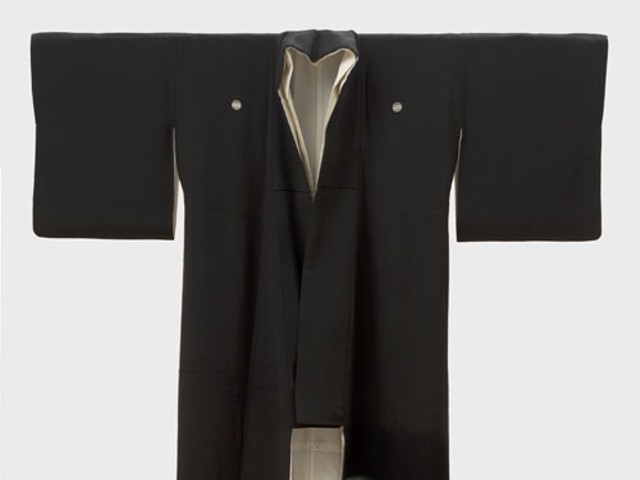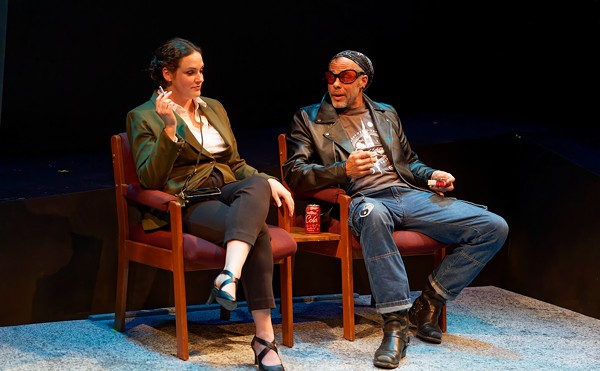Oedipus King transpires outside the city gates of Thebes, a town that is not going to make anyone's list of the Ten Best Places to Raise Children. Thebes is plagued by fever and pestilence. The vines are parched, the ground is sere. Shepherding and grape stomping have given way to wailing and lamentations. As the story begins, supplicants arrive bearing an eternal flame — which might represent the search for truth that ensues throughout the evening. Or it could be a tribute to Sophocles himself, whose account of one man's date with destiny remains a blinding beacon of world theater.
Here's the back-story: When King Laius learned from an oracle that he would be killed by his own son, he left the infant to die on a mountain. Unhappily for Laius, the child was found and raised by a neighboring king, whom Oedipus mistakenly assumed was his own father. Long before Oedipus King begins, our protagonist inadvertently has killed Laius and married his widow, Jocasta (that'd be Oedipus' mother). Now, in an effort to rescue the city from blight, Oedipus is trying to track down the former king's killer (that'd be him).
Many a mystery has borrowed from Sophocles and employed variations on the theme of a policeman or journalist forced to solve a crime that leads back to himself. But most mysteries leave that extra wrinkle about sleeping with your own mother to the Greeks. And indeed, Sophocles knew what he was doing. He unravels his clues with the meticulousness of a Hitchcock thriller.
But there's a second dramatist at work here. The translation by David R. Slavitt is a deft balancing act that retains Sophocles' sense of formality and ritual while telling this fateful story in a conversational, accessible manner. "Let it go, drop it," Jocasta (Amy Loui) implores her husband as his relentless pursuit of the truth hones home. Slavitt's informal approach repositions the relationship between man and God. Apollo is discussed as casually as if he were a nearby neighbor. Yet familiarity is not to be confused with ease. Oedipus still personifies man's inability to avoid a life fraught with peril and pain.
Slavitt's earlier translation of Ovid's Metamorphoses provided the basis for Mary Zimmerman's waterlogged retelling of that ancient Roman work. Even without the aid of an onstage swimming pool, this current meticulous offering from Upstream Theater is a gift to the gods. The scenic design by Michael Heil features a circular, angled plinth whose floor artwork might have been borrowed from the dust jacket of Edith Hamilton's The Greek Way. As staged here by Philip Boehm, there's a sense that the actors are actually stepping out of the pages of literature.
There's much good work from those actors. As a wily old beggar who knows more than he wants to tell, John Bratkowski delights in making exposition an adventure. Peter Mayer's Creon begins the evening as Oedipus' loving brother-in-law but soon stiffens into a stern adversary. (We need not see the Thebes landscape gone barren; it is revealed in Mayer's severe face.) In the title role, J. Samuel Davis is commandingly understated. How easy the temptation to trumpet a line like Oedipus' query of Creon, "You dare to show your face?" Instead Davis hisses the question, compelling the viewer to listen ever more intently. Davis is not only the title character; he's also our guide into one of the theater's first complex characters, a leader who was "born to grief." The clarity of his performance burns as brightly as does the eternal flame that illuminates this thoughtful production.
President Charles Smith was not born to grief, but he sure has a lot to grieve about. With the election just days away, the prez is matter-of-factly informed by his closest aide that "everybody hates you, and you're out of cash." What's a president to do when he's desperate to retain the reins of power? But Smith doesn't even want that; power interests him not at all. "I just wanna get reelected," he plaintively howls.
Playwright David Mamet has no interest in reality here. Obviously, an authentic president, even a losing president, would be out campaigning on the final weekend before an election. Yet within this exaggerated premise, Mamet has structured a classic farce. Here the slamming doors that are synonymous with farce have been replaced by ringing telephones. In between calls President Smith nearly gets us into war with Iran (or is it Iraq? Smith has trouble distinguishing between the two) and threatens to sell off half of Nantucket Island for an Indian casino. He even considers switching the traditional Thanksgiving meal from turkey to tuna. Sorry, Charlie, that's one fish that won't fly.
Although Mamet is known for his scathing dramas, November turns out to be perhaps the gentlest, sweetest play in the Mamet canon. This is humor of futility, almost as if Mamet is conceding that the problems besetting American politics are so beyond a playwright's solving that we might as well sit back and laugh. Yet throughout his preposterous story, Mamet has laced in much to think about. What is democracy? According to President Smith, democracy is the constant collision of special-interest groups. And how do you get those special-interest groups to do what you want? That one's easy: You bribe them.
The St. Louis Actors' Studio production is a winner by a landslide. From the moment the lights rise on scenic designer Patrick Huber's fragment of the Oval Office and President Smith rises from his desk through the strength of his kinetic fingers, Alan Knoll's Chief Executive is a bravura portrayal. Try to imagine Richard Nixon's angry egoism processed through Jack Benny's benign timing, and you'll sense the measure of Knoll's achievement. Although Smith is clearly a vile creation, it's hard to ever totally dislike Knoll. But if that's a flaw, it's the evening's only flaw.
Knoll's ferocious energy is matched by that of John Krewson as the implacable aide. Krewson and Knoll work beautifully together. Do you want to see ensemble acting at its best? Watch the give-and-take between these two. Michelle Hand niftily fills out the trio of savvy lead performances as a lesbian speechwriter who tries to blackmail the president into marrying her and her life partner on national television. She too is at the top of her form.
Director Bobby Miller fearlessly exploits every single inch of the tiny Gaslight Theater stage. If there's space, he'll use it. Have the prez off in the corner facing a black wall? Why not? Miller also understands pace — and not just frenetic pace. These three acts are so fraught with vigor that when the two intermissions arrive, a viewer is ready for a breather. (The entire evening plays out in a compact two hours.)
November's Broadway engagement only ran for 200-plus performances. Some New York critics treated the comedy condescendingly, suggesting that Mamet's humor was too obvious. But I should think that time will establish this farce as one of his most popular scripts. In years to come, it will be staged often. But you're not likely to see a more nigh-definitive production than this one at St. Louis Actors' Studio.





